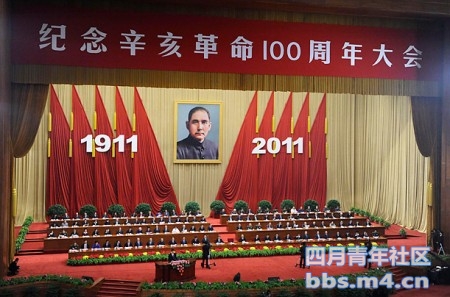|
|
本帖最后由 lilyma06 于 2011-10-12 13:07 编辑
【中文标题】尴尬的纪念日:中国纪念辛亥革命一百周年
【原文标题】Awkward Anniversary: China Marks the Centenary of the 1911 Revolution
【登载媒体】时代周刊
【原文作者】Hannah Beech
【原文链接】http://globalspin.blogs.time.com/2011/10/10/awkward-anniversary-china-marks-the-centenary-of-1911-revolution/

在纪念辛亥革命一百周年大会上,中国领导人齐聚孙中山的肖像之下。
在一个号称拥有5000年历史的国家中,一个世纪算的了什么呢?10月10日是中国1911年辛亥革命的纪念日,它结束了这个国家维系了2000多年的帝制。清朝(1644年-1911年)的覆灭源自于中国内陆城市武昌(目前归属武汉)的一次起义。在孙中山脆弱的领导下,它最终形成了一个共和体制。
星期天,中国领导人齐聚孙的大幅肖像之下,庆祝这历史性的时刻。这位所谓中国现代社会的奠基人所创建的共和国很快就被淹没在军阀混战之中,之后又经历了日本人在二战前的入侵和国共战争。胡锦涛在北京人民大会堂中的发言宣称,1911年的革命“开创了完全意义上的近代民族民主革命”。中国的政府新闻机构新华社指出:“1911年的革命不但让中国男人抛弃了耻辱的辫子,让中国女人放弃了痛苦的裹脚习俗,而且让人们改变了对皇帝的盲目信奉观念,以及对外国强权的恐惧心理。革命解放了人们几千年来受压制、受束缚的思想。”(星期天纪念仪式的电视转播中,另外一件值得关注的事情是前国家领导人江泽民露面。他没有出席7月份中国共产党庆祝成立90周年的活动,引起外界有关他染病和去世的谣言。)
从官方意义上讲,中国的帝制在1911年就结束了。但是,上台62年、基本类似于另一个朝代的中国共产党的“天意”难道没有遭遇过挑战吗?Richard McGregor在他著名的作品《党》一书中说,中国遮遮掩掩的领导方式缺乏统一的思想体系,但极为有效地确保了自身的生存能力。因此,过去二十年中的物质收获让中国变成了世界第二大经济体,而不平等和腐败也日益猖獗。目前中国最大的丑闻基本可以被分为两类:一类是犯错误的政府官员——掠夺农民的土地、贪污国家金库;另一类是骄横的“富二代”——在交通肇事后免于处罚、不受社会法制约束。
无论胡是怎样空口白牙地说1911年是一场“民主解放”运动,中国的民主依然是一个遥远的梦境。中东和北非爆发的政治运动让中国领导人不寒而栗,于是他们展开了人权镇压行动,从艺术家、不同政见者到记者和律师都被波及。即使在最近几个星期,一些独立候选人期望竞选人大代表——这是在法律允许范围之内——的行为,也因官方干涉而遭遇挫折。
与此相比,小小的台湾——共产党的死敌国民党在1949年逃走后落脚的地方——已经从一个在戒严法令下瑟瑟发抖的小岛,成功地转化为运作良好的民主体制。台湾自称中华民国,一直把10月10日作为“国庆日”。过去几十年来,北京从不理会这个日子,它只庆祝10月1日,这是共产党的中华人民共和国正式成立的日子。但是在近几年,中国似乎有意掀起了一股辛亥热潮,当然其中还存在一些限制。北京在星期日的庆祝活动登上了各大报纸的头条新闻,但是大都没有与10月1日的盛况做比较。孙的肖像被临时展现在天安门广场,旁边则是永远矗立的、标志性的、人民共和国创立者毛泽东的肖像。北京一场纪念孙的歌剧在最后一刻被取消上演,据说原因是“运输问题”,或许这是因为它的故事与共产党理想化的教科书并不十分契合。例如,孙的理念之一是三民主义,即民族、民权、民生。孙在1925年去世,他的遗产被北京和台湾共同继承,但是中国领导人并没有迈出彰显“民权”的一步。
胡在10月9日的讲话中呼吁中国与台湾的和平统一。一天之后,台湾总统马英九粗暴地拒绝了任何政治统一的可能性,而且还敦促北京尽快赶上台湾民主的步伐。中国一直没有提到一件有关清朝覆灭的事情:象征中国帝制灭亡的10月10日的起义,部分原因是清政府朝廷内部的改革人士所倡导的新理念的逐渐深入人心。北京的统治者或许在苏联改革和解体事件上吸取了一些教训:改革会带来麻烦。对于中国共产党这个生于政治动乱年代,并且已经执政六十年的党派来说,革命并不是它的强项。
原文:
Chinese leaders gather sit beneath a portrait of Sun Yat-sen during an event to mark the 100th anniversary of the Xinhai Revolution.
In a country that claims five millennia of history, what's a mere century? Oct. 10 marks the 100th anniversary of the start of China's 1911 Xinhai Revolution, which ended 2,000 years of imperial rule. The fall of the Qing Dynasty (1644-1911) was precipitated by an uprising in the central Chinese city of Wuchang (now part of Wuhan) that eventually led to the formation of a Chinese republic under the tenuous leadership of Sun Yat-sen.
This milestone was celebrated on Sunday by China's leaders, who gathered under a massive portrait of Sun, the so-called founder of modern China whose republic was soon engulfed by warlord battles, struggles between the Chinese Communist Party (CCP) and the Kuomintang, plus the Japanese invasion ahead of World War II. At the Great Hall of the People in Beijing, President Hu Jintao proclaimed that the 1911 event was “a thoroughly modern, national and democratic revolution.” Xinhua, China's state-run news agency, opined that “the 1911 Revolution not only rid Chinese men of humiliating ponytails and women of the excruciatingly painful foot-binding, but also removed the people's blind faith in the emperor, as well as fear of foreign powers. The event has since been emancipating people's minds from thousands of years of oppression and self-enclosure.” (Sunday's televised ceremony was also notable for the appearance of retired leader Jiang Zemin, Hu's 85-year-old predecessor, who had missed a July celebration of the Chinese Communist Party's 90th anniversary, leading to rumors about his illness or even death.)
Imperial China may have officially come to an end in 1911. But is the 62-year-rule of the Chinese Communist Party akin to that of another dynasty whose “mandate of heaven” is being challenged? In his excellent book The Party, Richard McGregor notes that China's secretive leadership is bereft of ideology but is highly skilled at ensuring its own survival. As a result, the material gains made in the past two decades have turned China into the world's second-largest economy. But inequality and corruption have proliferated, too. The biggest scandals in China today tend to either involve errant officials—grabbing land from peasants or money from state coffers—or misbehaving fuerdai, the coddled “second-generation rich” who have acted with impunity in traffic accidents and other intersections with society.
And no matter what lip service Hu paid to 1911 as a “democratic revolution,” democracy in China is a dream deferred. The political upheavals in the Middle East and North Africa have spooked China's leaders, who have unleashed a human-rights crackdown that has netted everyone from artists and dissidents to journalists and lawyers. Even attempts in recent weeks by some independent candidates to run for local People's Congress positions—something that is allowed by law—have been foiled by official interference.
By contrast, little Taiwan—where the Communists' enemy, the Kuomintang, fled in 1949—has transformed from an island cowering under martial law to a functioning democracy. Taiwan, which calls itself the Republic of China, has long labeled Oct. 10 “National Day.” For decades, Beijing ignored the date, celebrating Oct 1, when the Communist People's Republic of China was officially founded, as its “National Day.” But in recent years, Xinhai fervor has been authorized in China, albeit with some constraints. Sunday's festivities in Beijing were splashed across the front pages of state newspapers, but they paled in comparison to those of Oct 1. A portrait of Sun may have been temporarily placed in Tiananmen Square near the permanent, iconic image of Chairman Mao Zedong, the founder of the People's Republic; but an opera commemorating Sun was cancelled at the last-minute for “logistical reasons” in Beijing, presumably because his life hardly conformed to an idealized Communist storybook. One of Sun's political philosophies, for instance, was the Three Principles of the People: nationalism, democracy and the people's welfare. Sun died in 1925, and his legacy is claimed by both Taipei and Beijing. But the Chinese leadership hasn't gone out of its way to highlight the democracy part of Sun's vision.
In his Oct. 9 speech, Hu called for China's peaceful reunification with Taiwan. A day later, Taiwan's President Ma Ying-jeou rebuffed any such political union for now and instead urged Beijing to emulate Taiwan's democratic reforms. But there's one aspect of the Qing's dying days that is rarely mentioned in China. The Oct. 10 uprising that signaled the end of China's imperial tradition happened in part because of ideas that flourished during a reformist era led by certain members of the Qing court. Beijing's rulers are thought to have learned the same lesson from perestroika and the dissolution of the Soviet Union: reforms can bring troublesome consequences. For the Chinese Communist Party, birthed during political upheaval yet ruling for more than six decades, revolution isn't quite what it used to be.
|
评分
-
2
查看全部评分
-
|